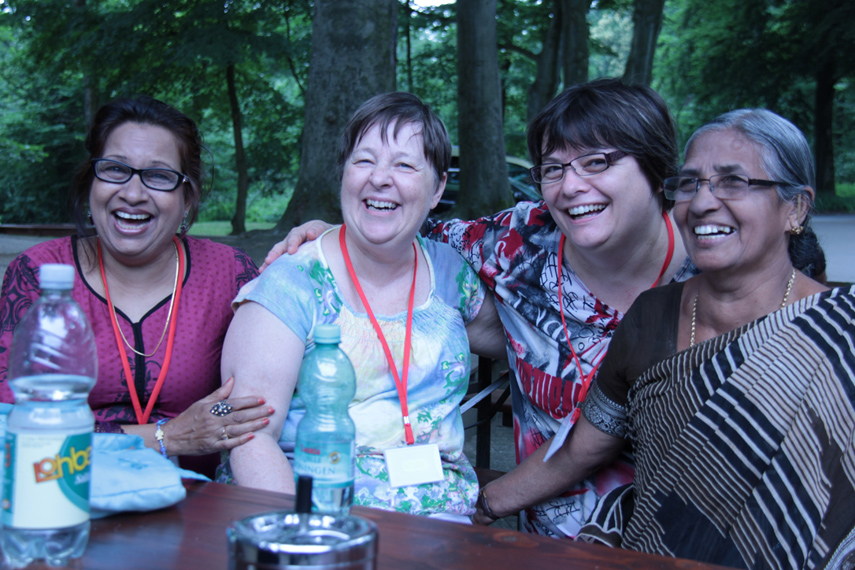
During the International Seminar and General Assembly of the WMCW held in Haltern am See in Germany last July, women came together to share and discuss experiences from their own communities. This led to a motion on the situation of women being presented to and adopted by the Assembly.
This year, on March 8th, let us consider the MMTC’s theme “Let’s build a just, fraternal and sustainable society” in a new light: that of women’s experiences and commitments. Let us applaud the mobilisation and involvement of women all around the world. Let us reaffirm that we, as women, are more determined than ever before to move forward in solidarity, combating situations which threaten the dignity of other women, our sisters on this planet.
LET’S BUILD A JUST SOCIETY:
Women are men’s equals! Whether at home, at work or in the community, any gesture or campaign which may lead to greater recognition of the fundamental rights of women and girls contributes towards a fair society!
In Bangladesh: Following the terrible fire at the Tazreen textile factory and the collapse of the Rana Plaza, where a large majority of workers were female, various associations are calling for the companies to compensate the victims and their families. Hundreds of workers, both male and female, are now unable to pay their medical bills, rent or even to buy enough food to sustain themselves properly.
In India: Last January, the Movement of Christian Women was launched in Bangalore during a national conference. The participating women stated their intent “to commit to moving out of their comfort zones, to promote acts of solidarity and justice, to defend the dignity of women and to establish networks with other communities.”
A FRATERNAL SOCIETY:
True fraternal solidarity is impossible to achieve without recognising and showing complete respect for women. A society where the female body is no longer a form of merchandise leading to violence, human trafficking, female circumcision, prostitution. No! Women are co-creators of and participants in abundant life in their own right, and all forms of degradation must be abolished.
In Egypt: a women’s association is working to physically help women and young girls by monitoring what is happening on Tahrir Square and stepping in where they witness aggression. Working alongside other groups, this association provides the victims with medical, psychological and legal aid.
In Haiti: following the 2010 earthquake, women and girls are increasingly becoming the targets of violence and rape. Women’s centres in the north and south of Port-au-Prince are raising awareness, training the national police force as well as the press, schools and women to demand dignity and justice. They are also helping the women with psychological and medical aid and court cases.
AND A SUSTAINABLE SOCIETY:
According to the 2013 report by the National Institute for Demographic Studies (INED), there are just over 7 billion inhabitants on Planet Earth today. According to the United States Census Bureau, 49% of the world’s population is female – a minority due in part to selective abortion in certain countries. However, women and the work they carry out within their families and communities are essential at all levels for the sustainability of the planet.
In Japan: Since Fukushima, women have shown leadership in the antinuclear movement. They condemn misinformation coming from the government, and campaign for the population to be kept informed about the environmental and health-related consequences of radiation, with a view to protecting children, the future generations.
In Guatemala: Women fight to defend their rights and those of their community, faced with mining projects which could affect the environment and be harmful to the population. These women run enormous risks by demonstrating openly – physical assault, harassment, assassination – as there is so much at stake with these projects.
In Quebec: During the “Maple Spring” of 2012, women from all backgrounds took to the streets and mobilised the population by banging pots and pans in street demonstrations. Why pots and pans, common kitchen utensils? According to one participant, “pots and pans represent oppression, the confinement of women to the private sphere. They symbolise feminine anger where in the past they have also symbolised their work and their power, notably in the workers’ movement.” No chance of dropping the protests and losing the gains already made!
These few examples demonstrate the power and importance of women-led protest, not only for participants themselves, but also to make the world a better place for every human being.
As labour activists and Christians, we (women and men) are aware that to win these fights, we must join forces. In order to build a just, fraternal and sustainable society, fundamental human rights must be respected.
For the General Secretary of the WMCW
Nicole (MTC Quebec)
-------------------------------
Translated by Philippa Criddle within the initative PerMondo. Sponsored by Mondo Agit offering website translation services.




